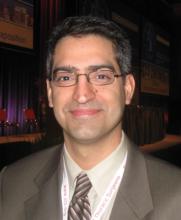SAN DIEGO – Results from the latest workforce survey conducted by the Thoracic Surgery Residents Association reveal some troubling trends.
Nearly one-third of respondents who identified themselves as seeking employment (31%) reported having no job offers 10-12 weeks before completing their residency, and 17% reported education-related debt exceeding $200,000.
"We have to anticipate that continued unease regarding job availability, combined with increasing debt burden, may be a concern for potential trainees, and a possible deterrent or barrier to their matriculation into cardiothoracic surgery," Dr. Inderpal S. Sarkaria said at the annual meeting of the Society of Thoracic Surgeons.
At the same time, however, 65% of survey respondents said that they would positively recommend cardiothoracic surgery as a career to potential applicants. "I believe that the attraction and thrill of what we do as cardiothoracic surgeons is real and will always be an advantage to our specialty in attracting potential trainees," said Dr. Sarkaria, a cardiothoracic surgeon at Memorial Sloan-Kettering Cancer Center, New York.
First administered in 2006, the Thoracic Surgery Residents Association (TSRA) Workforce Survey became mandatory in 2007 as a prerequisite to taking the American Board of Surgery In-Training Examination (ABSITE), which is typically taken during the final 10-12 weeks of cardiothoracic residency. Results from a separate TSRA survey question administered during the 2009 ABSITE identified approximately 11% of general surgery residents anticipating careers in cardiothoracic surgery.
"This is encouraging and has been steady over the past few years, but it’s still far diminished from prior years," Dr. Sarkaria said. "Other surveys from the STS [Society of Thoracic Surgeons] and the American Association of Medical Colleges have identified primary concerns and factors affecting general surgery residents’ choice of specialty, such as job security/availability, ability to balance work and personal life, mentorship, and length of training."
Concerns regarding these decreased matriculation rates, he continued, "are compounded by concerns regarding an anticipated shortage of cardiothoracic surgeons over the next 1-2 decades, in which some have suggested that an additional 100 surgeons per year will need to be trained in order to overcome this."
On behalf of the TSRA executive committee, Dr. Sarkaria presented results from 299 cardiothoracic surgery residents who completed the 2010 survey, which included questions about employment, training experience, education-related debt, and determinants of career choice.
Of the 299 respondents, 228 (76%) were citizens of the United States. The majority (84%) were from 2- or 3-year residency programs, while 9% were from 6-year integrated programs. More than half (69%) were in postgraduate years 6-10.
Nearly one-third of respondents (32%) identified adult cardiac as their primary career of interest, followed by mixed cardiothoracic (23%), general thoracic (22%), congenital (11%), heart failure/lung transplant (5%), aortic (5%), and other (2%).
Among respondents who identified themselves as seeking employment, 45% reported that they had more than two job interviews by the time they completed the survey, 23% had two interviews, 15% had one interview, and 17% had no interviews. In addition, 41% reported that they had two or more firm job offers at the time they completed the survey, 28% had one job offer, and 31% had no job offer.
Dr. Sarkaria reported that there has been a steady increase in reported education-related debt between $150,000 and $200,000, from 12% in 2007 to 16% in 2010. The rate of reported education debt exceeding $200,000 increased more than twofold during the same period, from 8% in 2007 to 17% in 2010. "This may be a pertinent financial barrier or deterrent to potential trainees who are considering careers in cardiothoracic surgery," he commented.
When asked about the adequacy of their residency training, 79%-85% described their current training program as adequate and 39% anticipate additional training, primarily in congenital pediatric surgery or transplant and assisted heart devices.
The survey found that use of the Thoracic Surgery Directors Association (TSDA) curriculum "is sporadic, both on an individual and programmatic level," Dr. Sarkaria said. "When asked about the benefit of the TDSA curriculum as an adjunct to their own educational clinical curriculums, 55% say that it is a useful adjunct, while the rest are uncertain of the benefit. I think this shows an opportunity for expansion upon the innovative foundation of the TSDA curriculum to create an improved, uniform, easily accessible, and relevant central repository of knowledge."
When asked about their primary determinants in deciding on a career in cardiothoracic surgery, types of cases and mentorship were the most important factors cited (41% and 32%, respectively).
When asked about when their choice of cardiothoracic surgery career was made – before, during, or after medical school (in general surgery residency) – no time point stood out. "All of these time points represent opportunities for us to improve our identification and mentorship of potential trainees, and provide the curricular flexibility allowing us to matriculate them into cardiothoracic residencies at these various educational stages," Dr. Sarkaria said.

